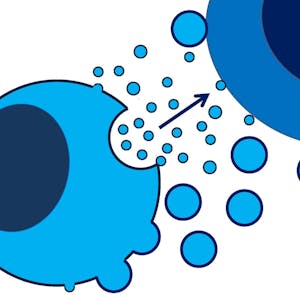This course aims to provide the basic knowledge about extracellular vesicles (EV) a generic term including exosomes, microvesicles, microparticles, ectosomes, oncosomes, prostasomes, and many others. It covers areas such as EV history, nomenclature, biogenesis, EV cargo as well as the release and uptake mechanisms, collection and processing prior to isolation, different isolation methods, characterization and quantification techniques.This course is divided into five modules. Module 1 is an introduction to the field and will cover the nomenclature and the history of EVs. Module 2 will focus on the biogenesis, release and uptake mechanisms of EVs as well as the different EV cargos (RNA, protein, lipids). In Module 3, we will focus on the collection and processing of cell culture media and body fluids such as blood, breast milk, cerebrospinal fluid and urine prior to isolation of EVs. Module 4 and 5 will present different isolation methods and characterization/quantification techniques, respectively. Here differential ultracentrifugation, size exclusion chromatography, density gradient, kit based precipitation, electron microscopy (EM), cryo-TEM, flow cytometry, atomic-force microscopy and nanoparticle tracking analysis will be presented.
The recommended prerequisites are college-freshman-level biology and biochemistry.
After a completed course you should be able to:
- Discuss the nomenclature and subgroups of extracellular vesicles.
- Describe the RNA, protein and lipid content of extracellular vesicles.
- Describe the basic concepts about the most common isolation and characterization techniques and how these techniques are used in the EV field.
- State the benefits and limitations of the most common isolation and characterization techniques for extracellular vesicles. + Explain the considerations that are important during the collection and isolation of EVs from different body fluid.
- Describe the release and uptake mechanisms of extracellular vesicles
All lectures are given in English.
Each of the five modules will be followed by an exam. All exams will be in the format of multiple choice questions.
The course is organized in collaboration between the International Society for Extracellular Vesicles (ISEV), University of California Irvine (USA), University of Gothenburg (Sweden) and Pohang University of Science and Technology (South Korea).
None
Syllabus
Syllabus - What you will learn from this course
Week 1
Introduction to the Course and the Field of Extracellular Vesicles
Week 2
Biogenesis, Cargo and Uptake of Extracellular Vesicles
Week 3
Collection and Processing of Cell Culture Media and Body Fluids Prior to Isolation of Extracellular Vesicles
Week 4
Methods for Isolating Extracellular Vesicles
Week 5
Techniques for Characterization and Quantification of Extracellular Vesicles
FAQ
When will I have access to the lectures and assignments?
Access to lectures and assignments depends on your type of enrollment. If you take a course in audit mode, you will be able to see most course materials for free. To access graded assignments and to earn a Certificate, you will need to purchase the Certificate experience, during or after your audit. If you don't see the audit option:
The course may not offer an audit option. You can try a Free Trial instead, or apply for Financial Aid.
The course may offer 'Full Course, No Certificate' instead. This option lets you see all course materials, submit required assessments, and get a final grade. This also means that you will not be able to purchase a Certificate experience.
What will I get if I purchase the Certificate?
When you purchase a Certificate you get access to all course materials, including graded assignments. Upon completing the course, your electronic Certificate will be added to your Accomplishments page - from there, you can print your Certificate or add it to your LinkedIn profile. If you only want to read and view the course content, you can audit the course for free.
Is financial aid available?
Yes. In select learning programs, you can apply for financial aid or a scholarship if you can’t afford the enrollment fee. If fin aid or scholarship is available for your learning program selection, you’ll find a link to apply on the description page.
Reviews
This is one of the wonderful courses any scientist or graduates trying to work on EVs must take. I enjoyed every bit of the course.
A lot of information broken down in logical and short segments (30 minutes) with great overviews of what each module will cover.
I found Ia very professional way to introduce everyone to the amazing world of EV. Professor show elegantly their knowledge. The course fulfils my expectations. Congratulations! Nice works
Excellent focused topic course. Upper division level and helps to have a good course in cell biology as a prerequisite..
